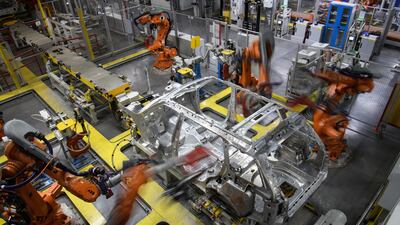Britain is expected to beat Spain in the race to build batteries for Jaguar Land Rover in a deal that has been described as the “most significant for decades”.
The owner of the car maker, Tata, is reportedly poised to finalise the deal to build a multibillion-pound factory in Somerset, with its chairman scheduled to meet British Prime Minister Rishi Sunak next week.
Tata was believed to be considering another site in Spain, which is a member of the European Union, unlike Britain, with both governments dangling hefty subsidies in a bid to secure a deal.
But the Indian conglomerate is thought to have come down in favour of the UK, a decision said to have been swayed by financial support reportedly amounting to £500 million ($617 million) that was on the table.
Up to 9,000 jobs would be created at the site in Bridgewater, Somerset and it comes after Jaguar announced it would invest £15 billion ($18 billion) to make electric cars in the UK.
David Bailey, an expert on the UK’s car industry from the University of Birmingham, compared the deal to that which brought Nissan to Britain in the 1980s, which came after years of seemingly terminal decline.
“If this deal goes ahead, it will be one of the most significant investments in the UK automotive industry in decades,” Prof Bailey told The National.
“It will create thousands of jobs in battery assembly and in the supply chain but also it’s critical because it anchors Jaguar Land Rover car production in the UK.
“My real fear was that if the investment in battery manufacture had gone to the EU, that car assembly would have followed it."
The proposed deal comes after a series of setbacks for the car battery industry in the UK.
Stellantis, one of the world's largest car makers, warned it would be unable to keep its commitment to make electric cars in the UK and could have to close factories without changes to the Brexit deal.
A start-up called Britishvolt, which had promised to build a massive battery factory in the north-east of England, went out of business this year.
Prof Bailey said the country is faring “badly” when it comes to encouraging the manufacture of car batteries although the deal means the UK is now beginning to play catch up with the US and Europe.
Be deal in Somerset, the only battery plant project underway in the UK was the Envision plant near Sunderland.
“Yet there are 35-40 gigafactories being built or planned in the EU, so the UK is well behind.
“Also massive investment in the US on the back of Biden’s Inflation reduction act. That’s been a huge game changer for getting investment in the US. Also, there’s huge investment in China.
“The UK has been standing on the sidelines watching and I think finally, with two investments planned, it’s starting to move.”
He called for “substantial” financial support and a reduction in energy costs if Britain is to catch up, as well as a re-examination of post-Brexit trade rules to make trade with the EU easier.
Just exactly how much the UK government is subsidising the factory is unclear but the deal is tied to providing financial support to Tata to de-carbonise it steel making plant in south Wales.
According to the BBC, along with additional energy discounts, it will bring the total incentive package £800 million to Tata close to ($990 million).
That compares to the US Inflation Reduction Act which paves the way for offering £299 billion ($370billion) in subsidies to companies to locate production and supply chains to America.


